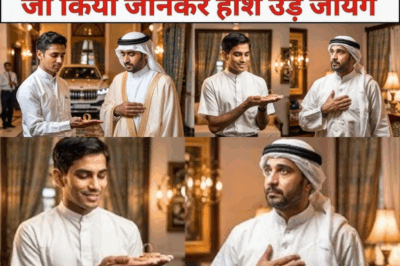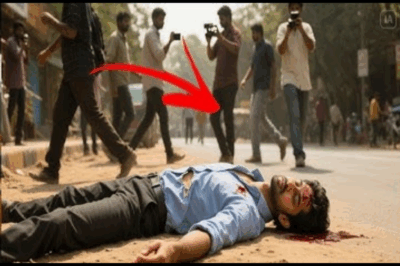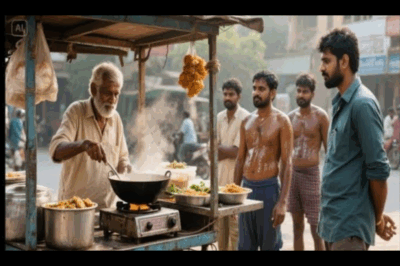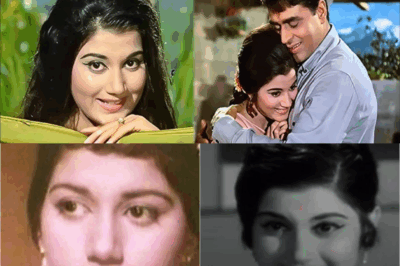Closed Doors, Open Wounds: The Viral Video that Unmasked a Son’s Violence against His Father
Introduction
What happens when the same hands that once taught you to walk become the ones you are forced to beg for mercy from? What becomes of a father’s dignity when he must plead with his own son to spare him from humiliation—and pain? A recent viral video from Nagpur has shocked India, tearing open the curtain that too often hides family violence, fear, and denial. But is this just one family’s dark secret? Or is it a story playing out behind many closed doors in our society?
The Video That Made India Shudder
The footage circulates on every phone, its images impossible to ignore. Inside a modest house in Nagpur’s Shanti Nagar, an elderly father sits trembling on a sofa. In front of him stands his own son, not with affection or respect, but with anger radiating from every gesture. The young man raises his hand—again and again—each slap an echo of broken trust. Sometimes he pulls his father by the hair, sometimes gripping his throat, as if to erase every ounce of dignity the old man still has.
Desperate, the father joins his hands in supplication, begging, pleading—while the mother, torn between panic and helplessness, tries half-heartedly to intervene. Her attempts are met with disregard. Rage has replaced love. The camera, hidden somewhere out of sight, records not just the violence, but the chilling silence. The voices are muffled, but the scene needs no sound; the images themselves scream of cruelty.
A Family’s Dark Secret Exposed
What compelled someone to record this scene—was it a neighbor? A concerned relative? We don’t know. But with each second of footage, a deeper rot is revealed: a moral, social, and cultural sickness that prefers denial over accountability.
Once the video went viral, Nagpur Police had no choice but to act. Tracing the location, they arrived at a home in Mudiyaar Chowk. Most would imagine the battered father, upon seeing the police, would finally find the courage to speak out. That is not what happened.
Instead, faced with the arm of the law, both parents recoiled—not from the son, but from the authorities themselves. The mother, whose husband had just been publicly humiliated, met the police with hostility, demanding, “Who are you to interfere in our family matters?” The father, whose ordeal had played out for all the world to see, denied everything. “Nothing happened,” he insisted—burying his suffering under a mask of forced calm.
Denial, Shame, and the Price of Silence
Why did this father, so clearly battered and broken, refuse to complain? The answer lies in fears that have crushed generations: fear of social dishonor, fear of losing a child—even a violent one—and, above all, fear of disrupting the family’s fragile façade.
When police officers showed the couple the viral video, the father’s excuses collapsed. He broke down in tears—in front of strangers, on camera, and in front of the very officers who could help him. Torn between the shame of admitting his suffering and the terror of public exposure, he chose—and failed—to protect both.
Is this just one story from Nagpur? Or are there countless parents like him, enduring private hells, silenced by the threat of scandal? The answer is all too clear. Every society contains secrets hidden behind closed doors—doors that muffle pain, save appearances, and bury justice.
A Glimpse Into the Broken Home
The incident in Shanti Nagar isn’t isolated. Neighbors claim frequent disruptions, fights echoing through thin walls. Family disputes, they say, are common in this household. But none anticipated that a son would turn so violently on the father who raised him. The video, shot from a distance, offers only the exterior—there is no script explaining the son’s rage, no background about the tensions that led to this explosion.
But was it a sudden flare-up or a tragic accumulation of years of contempt, disappointment, and perhaps other, hidden abuses? Whatever the case, one reality remains: nothing excuses violence, especially when the victim is a parent.
How Should a Society Respond?
Police did what was in their power. Despite having no formal complaint, they sternly admonished the young man—warning him that any repetition would be dealt with harshly. They made it clear that the house is now under observation: the arm of law, for once, extending inside the home.
But the police’s intervention exposes a larger dilemma. How should society respond? In countless homes, sons and daughters repay a lifetime of parental sacrifice with disrespect, and sometimes outright brutality. Most incidents never make it beyond the living room, concealed by fear, pride, and obsolete ideas of family honor. Too often, we valorize “keeping things within the four walls”—forgetting that silence doesn’t heal, it only festers.
Why Do Victims Stay Silent?
Every expert on domestic violence knows: complaint is the exception, not the rule. Victims, especially parents, often protect their abusers out of misplaced love or deep-seated fear. Cultural taboos equate exposing abuse with bringing dishonor to the family name. The same parents who spent decades nurturing children cannot imagine seeking justice— instead, they choose suffering over scandal.
In this case, we saw a spectacle—parents, shamed in their own home, begging police to go away and let their wounds fester. Society, too, bears responsibility: neighbors look the other way, relatives tut-tut in private but keep quiet, fearing reprisal or embarrassment.
The Need for Reckoning—and Responsibility
This story is not just a viral video. It’s a challenge—to all of us. It forces us to ask: How many more fathers and mothers are being humiliated or hurt behind closed doors? How many elders, once the pride of their homes, live in fear of the very children they raised?
It’s time to shatter the silence and stigma. No family’s honor is more valuable than a human life. Sons and daughters who abuse their parents should not be protected; they should face consequences. And as a society, we have a moral duty to support the elders among us—to notice, to intervene, to refuse the easy comfort of ignorance.
Conclusion
Today’s horror in Nagpur is tomorrow’s warning for us all. When the ones who gave us everything grow old, frail, and vulnerable, will we offer them nothing but fear and humiliation in return?
You may choose to look away, to dismiss this as just another “family matter.” But remember—what’s sown behind closed doors now will one day echo in every corner of society. The tears of parents are not silent. They cry for justice, for dignity, for respect.
And one day, if we fail to listen, we will all bear the consequences.
News
कहानी का शीर्षक: इंसानियत की सबसे बड़ी दौलत: टैक्सी ड्राइवर राज और विदेशी पत्रकार मारिया की सच्ची कहानी
कहानी का शीर्षक: इंसानियत की सबसे बड़ी दौलत: टैक्सी ड्राइवर राज और विदेशी पत्रकार मारिया की सच्ची कहानी शहर की…
कहानी का शीर्षक: ईमानदारी का इनाम: एक गरीब वेटर, एक अरबपति का दिल, और बदलती किस्मत
कहानी का शीर्षक: ईमानदारी का इनाम: एक गरीब वेटर, एक अरबपति का दिल, और बदलती किस्मत क्या ईमानदारी की कोई…
सड़क की धूप और इंसानियत की ठंडक: रमेश की कहानी
सड़क की धूप और इंसानियत की ठंडक: रमेश की कहानी दिल्ली शहर की दोपहर थी, गर्मी अपने चरम पर थी।…
वह छोले-चावल का ठेला, जिसने एक अरबपति को भी भूख का असली स्वाद चखाया
वह छोले-चावल का ठेला, जिसने एक अरबपति को भी भूख का असली स्वाद चखाया जुलाई की तपती दोपहर थी। वाराणसी…
The Vanished Star: The Painful Life and Mysterious End of Bollywood’s Beloved Sister, Nazima
The Vanished Star: The Painful Life and Mysterious End of Bollywood’s Beloved Sister, Nazima Introduction In the golden age of…
The Tragic Story of TV Actress Dolly Sohi: A Battle with Cancer, Family Loss, and Unyielding Courage
The Tragic Story of TV Actress Dolly Sohi: A Battle with Cancer, Family Loss, and Unyielding Courage Introduction In the…
End of content
No more pages to load












